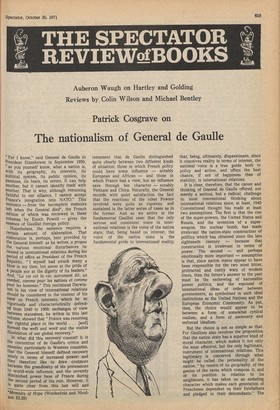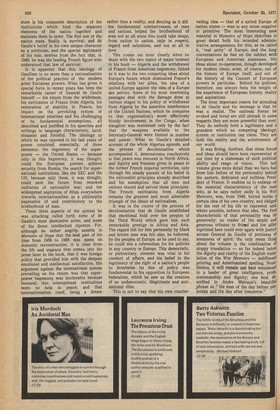Patrick Cosgrave on
The nationalism of General de Gaulle
Auberon Waugh on Hartley and Golding Reviews by Colin Wilson and Michael Bentley
"For I know," said General de Gaulle to President Eisenhower in September 1959, as you yourself know, what a nation is, With its geography, its interests, its Political system, its public opinion, its Passions, its fears, its errors. It can help another, but it cannot identify itself with another. That is why, although remaining faithful to our alliance, I cannot accept France's integration into NATO." This sentence from the incomplete memoirs left when the General died*, the French edition of which was reviewed in these columns by Enoch Powell — gives the essence of Gaullist foreign policy. Nonetheless, the sentence requires a certain amount of elaboration. That elaboration is, perhaps, best provided by the General himself: as he writes, a propos the various emotional disturbances he caused in international relations during his Period of office as President of the French Republic, "I myself had struck many a blow in my time, but never at the pride of a people nor at the dignity of its leaders." And, "La vie est la vie; autrement dit, un combat, comme pour les nations et comme Pour les hommes." This restrained Darwinism in his view of international relations should be considered in the context of his view on French interests, which he so vigorously and characteristically defended from 1940 to 1968: exchanges of view between statesmen, he writes in this last 'volume, showed that "France was resuming her rightful place in the world . . . [and] fsprmed the weft and woof and the visible illustration of our global recovery." In what did this recovery consist? It is the contention of de Gaulle's critics and enemies, particularly in Western countries, that the General himself defined recovery solely in terms of increased power: and theY therefore like to draw contrasts between the grandiosity of his pretensions to World-wide influence, and the severely diminished power base of France during the second period of his rule. However, it iS quite clear from this last will and *Memoirs of Hope (Weidenfeld and Nicol SO £3.25) testament that de Gaulle distinguished quite clearly between two different kinds of situation: those in which French policy could have some influence — notably European and African — and those in which France had a view, but no influence save through her character — notably Vietnam and China. Naturally, the General records with quiet satisfaction the fact that the reactions of the other Powers involved were quite as vigorous and sustained in the latter series of cases as in the former. And so we arrive at the fundamental Gaullist case: that the only serious and consistent voice in international relations is the voice of the nation state; that, being based on interest, the voice of the nation state is the fundamental guide to international reality; that, being, ultimately, dispassionate, since it conceives reality in terms of interest, the national voice is a true guide both to policy and action, and offers the best chance, if not of happiness then of stability, in international relations.
It is clear, therefore, that the career and thinking of General de Gaulle offered, not merely a serious, but a radical, challenge to most conventional thinking about international relations since, at least, 1945 Conventional thought has made at least two assumptions. The first is that the rise of the super-powers, the United States and Russia, and the invention of a superweapon, the nuclear bomb, has made irrelevant the nation-state construction of politics which has obtained since the late eighteenth century — because that construction is irrelevant in terms of power. The second — and perhaps emotionally more important — assumption is that, since nation states appear to have been responsible for the two most bitter, protracted and costly wars of modern times, then the future's answer to the past must be the eschewing of nationalist power politics, and the espousal of international ideas of order between governments, as symbolised in such ideal institutions as the United Nations and the European Economic Community. As put, then, the choice would appear to be between a form of somewhat cynical realism, and a form of necessary and enforced idealism.
But the choice is not as simple as that. For Gaullism also involves the proposition that the nation state has a superior kind of moral character, which makes it not only the most effective, but the only legitimate, instrument of international relations. This legitimacy is conceived through what might be called the personality of the nation: "by reason of its geography, of the genius of the races which compose it, and of its position in relation to its neighbours, it has taken on an enduring character which makes each generation of Frenchmen dependent on their forefathers and pledged to their descendants." The state is his composite description of the institutions which bind the separate elements of the nation together and maintain them in order. The first law of the nation state, finally, is survival: and de Gaulle's belief in his own unique character as a politician, and the special legitimacy of his rule, derives from the fact that, in 1940, he was the leading French figure who understood that law of survival.
It is apparent that this ideology of Gaullism is no more than a rationalisation of the political practice of the modern great European powers. What has given it special force in recent years has been the remarkable career of General de Gaulle himself — his return from the wilderness, his extrication of France from Algeria, his restoration of stability in France, his impact on the prevailing system of international relations and his challenging of its fundamental assumptions, all described and justified in his speeches and writings in language characteristic, lucid, eloquent and forceful. The ideology to which he was opposed in his last years of power consisted, essentially, of three elements: the hegemony of the superpower — the United States — because only in this hegemony, it was thought, could the European powers achieve security from Russia; the search for supernational institutions, like the EEC and the UN, because only these, it was thought, could save the future from renewed outbursts of nationalist war; and the widespread aspiration of elites everywhere towards internationalism as a philosophy expressive of and contributory to the brotherhood of man.
These three aspects of the system he was attacking called forth some of de Gaulle's most dismissive scorn, and some of his finest intellectual ripostes. For, although he rather angrily, asserts in Memoirs of Hope that the best part of his time from 1958 to 1968 was spent on domestic reconstruction, it is clear from the lift and urgency that comes into his prose later in the book, that it was foreign policy that provided him with the deepest emotional and intellectual satisfaction. His argument against the international system prevailing on his return was that superpower hegemony was intolerable because immoral; that international institutions were no help to peace; and that internationalism itself, being a dream rather than a reality, and denying as it did the fundamental combativeness of men and nations, helped the brotherhood of man not at all since this could take shape, from nation to nation, only in respect, regard and salutation, and not at all •in love.
This comes out most clearly when he deals with the two topics of major interest in his book — Algeria and the withdrawal of France from American hegemony, linked as it was to the two competing ideas about Europe's future which dominated France's relations with her allies, the idea of a united Europe against the idea of a Europe des patries. Some of his most interesting passages deal with the damage done at various stages to his policy of withdrawal from Algeria by the assertive interference of the United Nations, which he compares to that organisation's more effectively bloody involvement in the Congo, when slaughter was restrained only by the fact that the weapons available to the Secretary-General were limited in number and power. What de Gaulle's detailed , account of the whole Algerian episode, and the process of decolonisation which accompanied it, demonstrates conclusively is that peace was restored in North Africa, and dignity and freedom given in peace to the former French imperial territories, only through his steady pursuit of his belief in the nationalist principles already described and his assumption that all men and nations shared and served these principles. The French extrication from Algeria remains the greatest and most admirable triumph of the ideals of nationalism.
It was in the course of the process of decolonisation that de Gaulle established that emotional hold over the peoples of the Third World which gave him such remarkable prestige in Africa and Asia.
The regard felt for him personally by black and brown men was felt also, he believed, by the peoples of Europe: as he used to say, he could win a referendum for his policies in any country in Europe. This democratic, or plebiscitary, element was vital in his conduct of affairs, and his belief in the legitimacy of the right of a nation's people to determine its line of policy was fundamental to his opposition to European federalism, which he saw as the creation of an undemocratic, illegitimate and antinational elite.
This is not to say that his own counter vailing idea — that of a united Europe of nation states — was in any sense negative or primitive. The most interesting new material in Memoirs of Hope describes in great detail both his intended administrative arrangements for this, as he called it, 'real unity' of Europe, and the long conversations he had on the subject with European and American statesmen. His ideas about co-operation, though developed for modern times, arise, of course, out of the history of Europe itself, and out of the history of the Concert of European powers in particular. Behind his policies, therefore, one always feels the weight of the experience of European history, reality and aspirations.
The most important reason for attending to de Gaulle and his message is that he was a realist. The national forces he evoked and loved are still abroad; in some respects they are more powerful than ever. They do embody both a legitimacy and a grandeur which no competing ideology, system or institution can claim. They are both the reality and the achievement of our world.
It was fitting, threfore, that these forces and ideas should have been represented in our time by a statesman of such political ability and range of vision. This last volume gives more detail than we have had from him before of the personality behind the austere, dedicated and ruthless President of France. It enables us to enlarge on the essential characteristics of the man who, as he says rather sadly in his War Memoirs, was, from 1940, buried inside certain idea of his own country, and obliged for the rest of his life to represent and, where possible, enforce that idea. The first characteristic of that personality was its generosity: no reader of the ample and generous tributes to friend and foe alike reprinted here could ever again with justice accuse General de Gaulle of pettiness or meanness of spirit: the only mean thing about the volume is the combination Of sloppy translation — so far indeed belovi the dignity and clarity of the English trans' lation of the War Memoirs — indifferent printing and Americanised spelling. None' theless, it will remain our best monument to a leader of great intelligence, pride, statemanship and dignity; one best described in Andre Malraux's beautiftli phrase as " the man of the day before yeS' terday and the day after tomorrow."



































 Previous page
Previous page